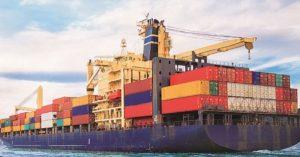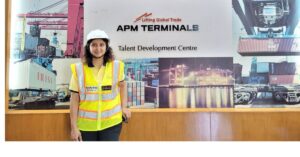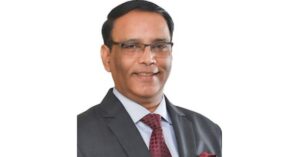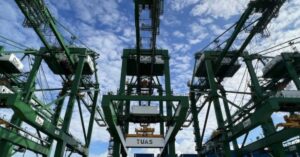Let us travel a couple of years back when we were discussing about digitalization in the shipping industry, at that time adoption had become a bit slow and we were the last industry to look at digitalization or adopting technology. But now everybody says Covid-19 has accelerated digitalization. I want you to review this period and what has changed, apart from Covid forcing them? What has changed in the last one-and-a-half year and how is the mind set of people running businesses towards digitalization?
Like you rightly said, I remember this conversation that we had long back and you were talking about how shipping is the last and since I am an outsider to shipping, I used to be always surprised because ships run very efficiently between two ports and all of this is thanks to technology. But the moment we come to land side and everything just seems to crumble down and there is not much happening, processes were very cumbersome and so when we started looking at it, we found it to be very surprising that there was so much paper in the industry. Over the last 5 years, not just us we have seen lot of initiatives globally and in India. So, the PCS going live, there have been other players like us. It has been a welcome change where there are newer entrants who are looking at the problem very seriously and recognizing that it slows down an industry that has got so much more potential. It is an industry that can be life changing, but at the same time if we are stuck in old processes, it can be life threatening because if the cargo doesn’t reach on time just because there was documentation error, it can be life threatening sometimes.
The change that I have seen over the last one year, of course has been driven by Covid to a large extent. But there is one major inflection point I feel and it is the time that business owners have got to step back and look at cost versus value and that has been a major driver, because I have had very large Indian forwarders who have now come on-board ODEX and we have been speaking to them for a long time, they change, they adopt digitization to the extent that they have wanted to. But today when we speak to them, it’s a completely different story because they have started recognizing that digital is an investment, let’s not at this as a cost, and let us look at what is the return on investment, and I think this has only been possible because of the pause that we had in April and May, when the volumes were down when it was becoming impossible to function, that’s when you start looking at where am I spending my dollar? Do I really need so much physical infrastructure? Do I really need my people to commute because trains are still not running in Mumbai? So what is the workaround? How do I make my people more efficient? When you start thinking of these things, you realize that maybe you should invest more in digital infrastructure than physical in infrastructure. This I feel has been the biggest change even for us. As a technology company there was always a complacence that we are very good digitally, we are very good with technology and then you suddenly realize that there is this completely different way of working.
I don’t need people to come to my office; we took a pause till December 31st, now we have extended work from home till 31st March and my hunch is that even at ODEX we will not go back to the way we were before. I have actually started looking at how to revamp our digital infrastructure much more than what we have been doing and the focus on physical has really gone down.
Now the focus is how do I have an extended hub of my office in people’s homes and are they comfortable, connected, is the Wi-Fi good, is the laptop good? These are questions we had never asked. So, this is something that happened not only at ODEX but across the industry. There are Indian entrepreneurs who have been doing the same business for the last 4 generations, whose focus usually has been on the physical infrastructure and they have started asking these questions, started adapting and adopting. I hear the word RPA much more now in the industry than I did last year. People are talking about APIs and I don’t have to tell them that the full form of an API is an Application Protocol Integration so those things have really changed. People have started understanding what SFTP means, they are taking the time to understand these terminologies and say can we integrate, can we not have people come to ODEX as a platform with a UI. I have an ERP and everything should happen on that so how do we integrate. It’s heartening to see that in India and I would say all across the world that we are seeing it now.
Good. Okay, we don’t mind giving the credit to Covid-19 for this acceleration but good things are happening, we should be happy about it. In the context of what you said, what is the focus right now in terms of the platform or solutions? We have PCX 1.x or we have lot of these digital freight forwarding platforms and we have lot of documentation processes, payment gateways have been established. So, what is the language that the industry is talking about, what are they asking and what’s happening?
One thing the industry is asking is how can I save time?
When we start speaking to clients, we realize that irrespective of whether it is e-documentation, e-payments, connected ports, all of this boil downs to just one thing – how quickly can my people get onto the internet and accomplish the movement of cargo from one place to another. So, this is the one question I hear often. The answers might be different depending on what level of the organization are we speaking to. So, if I speak to customer service, they will say digital documentation is very critical. If I speak to the finance function, they will say I need more options to pay a shipping line or a port and I need it to be faster, more secure and something that I can sit at home and use very easily. But when we talk to the owner 3 major things come out. The first is, how efficient does it make my workforce? Is it easy for them? Do they have to get trained on it? Can they access it very easily over the internet? So, how efficient does it make my workforce? Second, does it save me money? And third of course, will I be able to save time and hence my client will pay more service fee? So, these are the 3 things that matter to business owners especially when the money is tight. So, once we hear that, then we are able to put together and say, look, you probably not just need ODEX but you will also need to look at other solutions, maybe a digital forwarder can help you. So, I am never averse to recommending partner solutions or payment providers, precisely because we understand that one particular platform will not be able to solve the pains of every single person but it just boils down to 3 things, efficiency, time and money.
Okay. We have talked about what clients have been asking. But we had concerns earlier about these digital environment on data privacy and also going forward, standardization is another major issue that we need to look. So, where are we in these two areas?
I would like to tackle the standardization piece first and I was an advocate of standardization till I would say the March of 2019 and then I met someone who was working for the government of India, the then SSL Mr. Sivasailam, and we had this huge discussion on standardization and he left me with one thought, he said that if we standardize processes and this is a very strange thing that he mentioned; if we standardize processes, sometimes it means that we will not be able to move to the next generation of a solution.
What we need is not standard processes, what we need is more efficient processes and a framework that promotes the efficiency in process. He actually went ahead to explain, India has been able to adopt to a 5G spectrum much faster, has been able to move from CDMA to GSM much faster than US or Australia, because their telecom regulator laid down standards for a CDMA. So, when GSM came, it took them time to actually evaluate, change the standard, change the protocol, whereas in India, we didn’t do that. We said that okay, you need to ensure connectivity and bandwidth. So, the time the next protocol came in, it was much faster to adopt. So, the way I look at it is that come 2025, if you are looking at more and more autonomous ships coming in, how does that change the way cargo moves? Those are the questions we might not be able to answer today. If we try and set up a standard, it might not match the kind of documentation that is needed at that level or the kind of efficiency that can bring in by tweaking your processes to meet the kind of change that will happen in the physical infrastructure. So, my take on it has been slightly different, we look at workflow and we always say that okay, can we tweak the workflow to deliver documentation payments and hence cargo much more efficiently. So, instead of coming with a standard process, we say that okay, let us continuously break down processes and re-look at how things are being down and that’s something that we keep doing. Every time we go to a new shipping line or a new port, the set of questions that we ask changes on that, so there is no standardization per se.
Now, coming to data privacy, we have consciously adopted GDPR standards and one of the challenges that I have seen in India is that even though there are terms and conditions of a website or there is a direct NDA with the customer, sometimes customers think that they can ask us for data, especially the data which might not necessarily be theirs, so we follow one very single point of truth – the first and foremost authority of any cargo is the cargo owner, so any data about the cargo on our platform first belongs to the cargo owner and second belongs to any agent who has been appointed, it could be a shipping line, broker, forwarder and that is something we follow as sacrosanct.
If somebody asks us for some data we will tell them that we need authorization from the cargo owner and only then can we share anything. I think if all of us follow this gold standard, we would never have concerns about data privacy but from detailed framework, we don’t just follow the Indian data privacy policy, which has been so actively promoted by NASSCOM but we are following GDPR which means that as a platform there is one thing we take as gold standard, we do not even use the data for anonymous analytics, it’s a very thin line. We have data of so many customers so lot of times we get queries like, can you tell us how India’s exports have done this year? The answer is no. Can you tell us how commodities have moved this year, can we access that data? At certain levels in the organization, yes. Should we access that data? The answer is no. I come back to legal standards and statutory frameworks, so we follow GDPR. It is today, the most stringent data privacy act in the world followed by most of the EU nations. We are following that because a lot of the shipping lines are European, they are governed by GDPR and hence we as their partner are government by GDPR. I think it might be good for India to follow that because the moment you sign up for GDPR, your customers don’t have to worry about their data because not just can we not share it without adequate permissions, we also cannot use it, which means that I will not be able to predict and say that so much rice has been imported or exported out of India in this year because the moment I say that, anybody who’s half a brain can then extrapolate okay that these must be the exporters so we don’t even want to get into that kind of thing. So, yes that’s something that is an everyday affair. As a platform, there is another thing that we do consistently because we work with so many banks we also have to follow certain security guidelines and data privacy guidelines laid out by Indian banks which sometimes can be more stringent than the current national security policy on technology.
We have let’s say about 10, 12 different verticals looking at digital solutions. Some have implemented, some are in the evolution process. On the other hand, even government also is very actively into digitalization. Customs have come up with lot of digital initiates, which is a good thing. But in this digital environment, where are we? Are they talking to each other? Can a seamless flow be expected in future? Or still there are gap areas which both these entities and technology companies should focus?
It’s not just an Indian problem, it is a global problem that governments work at one pace, the private initiatives work at another pace and often times governments can sometimes be really far ahead of private entities. So, if you look at the Indian customs, I feel that they are evolving very fast. They are implementing a lot of solutions like the new shipping bill initiative that they had. It was timely, necessary and it was implemented without much fuss. We are looking at the SCMT which we have been waiting for the last two years. The channels that I have when we look at this particular framework from the government is that there is no consistency in terms of what gets delivered. On one hand you have a very responsive approach where this whole shipping bill module got implemented very fast. Whereas when we look at SCMT there have been delays. The entire industry is looking at SCMT and wondering in what form, how and when will it get implemented. Now, we are very close to getting it implemented because we have been closely involved.
When we look at India as the Mecca of IT innovation, a lot of it could have been done much more smoothly. When I look at the private ecosystem, there are a lot of players – we focus on documentation and of course some payment solutions, there are a lot of digital freight forwarders who are part of the ecosystem. We don’t really talk to each other and I feel that’s because there has been no open dialogue. So, Maritime Gateway probably was one forum where all of us would get together and discuss and we built a few relationships there, we built a few integrations. So, we have integrated with Softlink, with CargoWise, but I feel it’s probably10% of what we really could do. One of the things that I really miss in India is a platform where all the technology companies that work in this industry can come together. We have multiple associations but we don’t have an association for the technology companies. Yes, we are competitors but so are all the freight forwarders, they compete with each other. But they also come together to share knowledge and also work for what is relevant for them. So, I feel that’s one initiative that we are missing in India where there could be regular forum where all CEOs could meet and simply brainstorm and leave our baggage outside the door and not look at each other as competitors but look at what value add can we make to the industry as a whole and through collaboration because today if you look at Microsoft and Apple, they are collaborating, which was not the case maybe a decade earlier.
If we were to take a collaborative approach, I feel that things would work out much better, not just for the industry but also for ourselves, and that’s a dialog that we are missing in India. The government has been trying with a new NLP-Marine. Of course, we are hopeful that there will be a framework which is more open, allow more players to integrate and it is in the benefit of the country. If more players are allowed to integrate into an ecosystem like that but should government be driving it? That is not enough. We ourselves and I am also guilty of the same. I could possibly pick up the phone call one of them and say, let’s start something like this, but yes, I feel that it is time to do that and maybe you could be the catalyst there and you could get all of us on a forum and say guys, let’s do this for the industry. That will be a great way to go and I have seen it happen elsewhere in the world in other industries.
I agree with you. Maybe we are on the road to maturity. That would happen soon. So, looking at the opportunities that shipping and logistics industry can offer for technology companies, there are a lot of startups have also come up in this space fiercely competing in couple of areas, especially creating some platforms. So, you also come from a startup background. What is your suggestion for these startups which are trying to get their share and provide some innovative solutions? What should they really look at?
Three things from a business point of view, never lose focus of revenue. As startups, there are mistakes that we make but the most common mistake that I have seen, I have been guilty of, is to rely on external funding, and something that when I started ODEX, I said that I am not going to do. External funding will be necessary for growth capital but it should not be the seed capital. Now the seed capital should be able to generate revenue and before you go for any external funding. It gives you a lot of confidence if you, as a platform, are generating revenue and are either on the road to profitability or are profitable. A collateral of that is also something we have been guilty of even at ODEX that free is good to hear, but if your customer doesn’t pay you, they often may not value you so that’s the second thing that all startups should keep in mind and especially if you are working in this industry, don’t be disheartened because it is a slightly longer journey than any other industry but it can be very rewarding.
The good thing what we have learnt here is that the moment we are able to deliver in a country like India, the world opens up, which is not what I can say for every other industry. So, the moment we deliver something in India for shipping, word travels very fast, it is such a connected industry and not just because shipping lines are global or ports are global, every single forwarder from a mom-and-pop shop to the international forwarder, they are connected globally. When my customers here give us glowing reviews, it gives faith to my customers in GCC, it gives faith to my customers in West Africa, we have started receiving calls from other parts of the globe saying that why don’t you look at us because we feel we can benefit. So, my third advice is never get disheartened. It’s an industry that’s worth staying in. These are all from personal experiences.
Okay. Let us talk about your company. Obviously during Covid-19 as we have been discussing, you must be the biggest beneficiary of the pandemic in terms of getting business enquiries. I am not getting into the details of how much revenues you made? But what is your current focus in terms of technology development, or implementation and what are the future plans that you have?
The first thing is that we have been really blessed to stay steady and to stay afloat. Like you rightly said, you are not asking me revenues but I’m happy to share that our revenues have been steady because obviously April and May were really bad months. The entire industry took a hit but we were able to bounce back much faster because the digital adoption went up. We have also introduced a lot of schemes where we made it much more cheaper for customers to come onboard because we recognize that this is the time when not everybody will have money and every rupee that you spend, it has to go much further than it did before, but by doing that we have also been able to ensure with more people coming on the platform our revenues are currently on par with what we had last year, maybe a very slight increase, which if you compare year-on-year and the current situation, which means that we have actually grown. So that’s a comfort that I have really taken but the biggest thing for me has been the pace at which we have grown in multiple other countries.
In March 2020, we were live in 3 countries. Today, we are live in 9 countries and that’s been the pace of implementation that has happened so we are now live across the GCC except Saudi and we are live in tough economies like Iraq. We are now going live in Nigeria. So, that for me has been the biggest thing that the global footprint that we were aspiring to has happened much faster which also means of course there are technology challenges, there are infrastructure challenges that we have to manage, but that’s been actually the biggest boon from Covid that we have realized because it has changed the way we think. When we started implementing ODEX, we would say that okay, it will take us 3 months to get into a country and understand the shipping line processes there, the forwarder processes, the payment processes. We crushed all that and we have delivered an implementation in Qatar in a month, so the entire belt of Qatar, Kuwait, Bahrain, Oman, we did all of this within 45 days. It gives my team the confidence that it is possible and it’s not that we had lot of sleepless nights. We just re-looked at the way, like I said, we junked the word standardization, we just relooked at things. Customers really want it, they cannot go to office so we need to enable them, and we managed to deliver and it was done very well.
From the technology standpoint the biggest focus today for me is to build very robust integration frameworks because the biggest learning for me from Covid has been that the more integrated you are, the better it is for your customer, and so we have gone live with integrations with ERP providers across India with multiple banks and payment solutions providers in GCC. In West Africa, we have integrated with mobile money payment providers because the idea is I am adopting to; and I hate this word, but the new normal we call it, people are not going to get out of home very soon. You might go to a restaurant but ask them to come to work, it is still scary.
So, when we look at solutions, we look at it that way that how soon and how fast can we integrate with multiple ERP providers, banking providers, payment solution providers and to build a robust integration framework. That is right now my focus. I don’t want to talk about technologies and whether we will adopt RPA or whether we will look at AI. AI is another focus that I definitely have because when we are looking at bringing in efficiency, then we cannot discount that from a customer perspective. The way we look at it is to have much more robust integration frameworks and of course payments. So, to integrate with multiple payment solution providers across the world. That’s a key focus area. So, we will not ourselves get into payments but provide a pipe for our customers to pay more efficiently.












